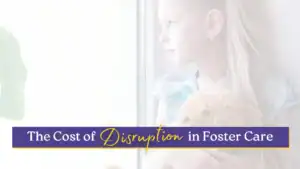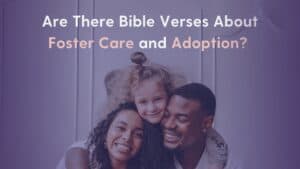My husband, John, and I always believed that if we weren’t getting pregnant, there was a reason. And to us, adoption seemed like the obvious reason. We figured that God had a different plan for us down the road, and we were OK with that. We had full lives and ministries, were active with our church and were all around really happy, content folks.
John and I became involved in the pro-life movement early in our marriage. And my interest in pro-life issues had begun to seriously grow ever since my second and third years of law school. Stemming from my pro-life passion was an eagerness to advance the cause of adoption.
I learned about a Christian woman named DeeannaMarie Wallace. She had been involved in adoption for decades, both personally and as a calling to help other kids and families. She and her husband, Randy, had nine kids, seven of whom were adopted. She had mentored and supported countless Christian families throughout the adoption process, and her name kept coming up whenever I spoke with anyone about adoption.
Deeanna was developing a reputation as the Christian go-to lady on adoption. I needed to connect with her. Through a series of phone calls and various connections, Deeanna invited John and me to their home for dinner.
Unknown to us, that night would change our lives forever.
Children in Need
John and I held hands and said grace around the dinner table in Deeanna and Randy’s modest home. Joining us were their five girls, who ranged in age from 5 to 15 and represented every size, shape, color, ethnicity and background. Several of the girls were already adopted; others were in the Wallace home through foster care.
“There are orphans right here in Hawaii who need adoptive families,” Deeanna told us passionately. “They’re trapped in foster care, and the church really needs to get involved.”
We looked at their girls. Here they were, former legal orphans in our own state, our own community, our own neighborhood.
Throughout the course of the night, we learned that these girls had experienced abuse, neglect and abandonment. Unspeakable, harrowing things were done to them by their birth parents, whose job it was to take care of and protect them. We also learned that if a child is in foster care long enough, eventually the birth parents’ rights will be terminated, and the child will become a “legal orphan.” And then that child will sit and wait. And wait. And wait. And wait.
These kids wake up each day wondering if they’ll have to pack up again and move to another foster home – for any or no reason.
And there they’ll sit, and if a loving adoptive family doesn’t come into their lives, they’ll turn 18 and “age out” or exit the foster-care system. Those who do will likely become adults who belong nowhere and to no one.
Deeanna told us, “Every year in the United States, more than 20,000 youth age out of the system. And not surprisingly, the statistics show that many of them end up in prison or at homeless shelters and receive government aid, and they sometimes have kids who also end up in foster care.
“In Hawaii,” she continued, “there are 2,500 kids in foster care. And hundreds are waiting to be adopted.”
John and I were stunned. There were children needing families in our own backyard? Could this be true? We were two reasonably smart people who’d been completely ignorant about a really big problem. Near the end of the evening, Deeanna showed us a picture of some friends of hers – a military family who had six children, all through the blessing of adoption. Deeanna said we reminded her of them.
Honestly, I thought she must be nuts to think that.
My head was spinning. John and I were Christ followers. We knew that God’s Word spoke frequently about God’s heart for orphans and the Christian’s duty to care for them. We had talked about adoption before, and we were always open to it, but we’d never pursued it seriously. We thought maybe it would happen after we had birth children. As pro-lifers, we’d always said we’d adopt any baby who would otherwise be aborted. That was a no-brainer.
Why would these kids in foster care be any different? How could we do nothing about what we’d heard? We’d been so blessed. We had room in our house. How could we turn our backs on kids in need?
We weren’t sure what we were going to do, but we knew we had to do something. Hearing about the needs of these kids awakened John’s sense of protection. He’s a military man, after all, and he couldn’t just sit back and not take action. He had to do something!
I kept thinking about the Good Samaritan in Luke 10:25-37. Remember the story? Jesus told a parable about a man traveling from Jerusalem to Jericho who gets attacked. He’s beaten, robbed and left for dead.
I sensed that God was challenging us, asking us if, like the religious men in the parable, we’d just pass by and do nothing. Or would we be like the Samaritan, who did something about the person in need right in front of him?
John and I talked and prayed about it a lot.
Talking and praying abstractly about the things that break God’s heart is one thing. Seeing and hearing needs up close and personal – in your face, literally – is clarifying. There was no way we could see what we were seeing – precious faces, voices, and lives of real kids in desperate need – and go back to our comfortable life unchanged.
There was no noble decision making; it was just crystal clear to John and me that we were going to do something. We were completely on the same page, something we paid close attention to. It wasn’t a hard decision; it was the obvious decision, set right before us. When we looked at the pros and cons, the obvious pros were that we were doing what Jesus commanded His followers to do and being who He commanded us to be. There weren’t really any cons that could compete with that.
We were excited – thrilled, really. And scared. But we believed as we trusted the Lord with all our hearts, leaned not on our own understanding, and acknowledged Him in all our ways that He was directing our path (Proverbs 3:5-6).
















